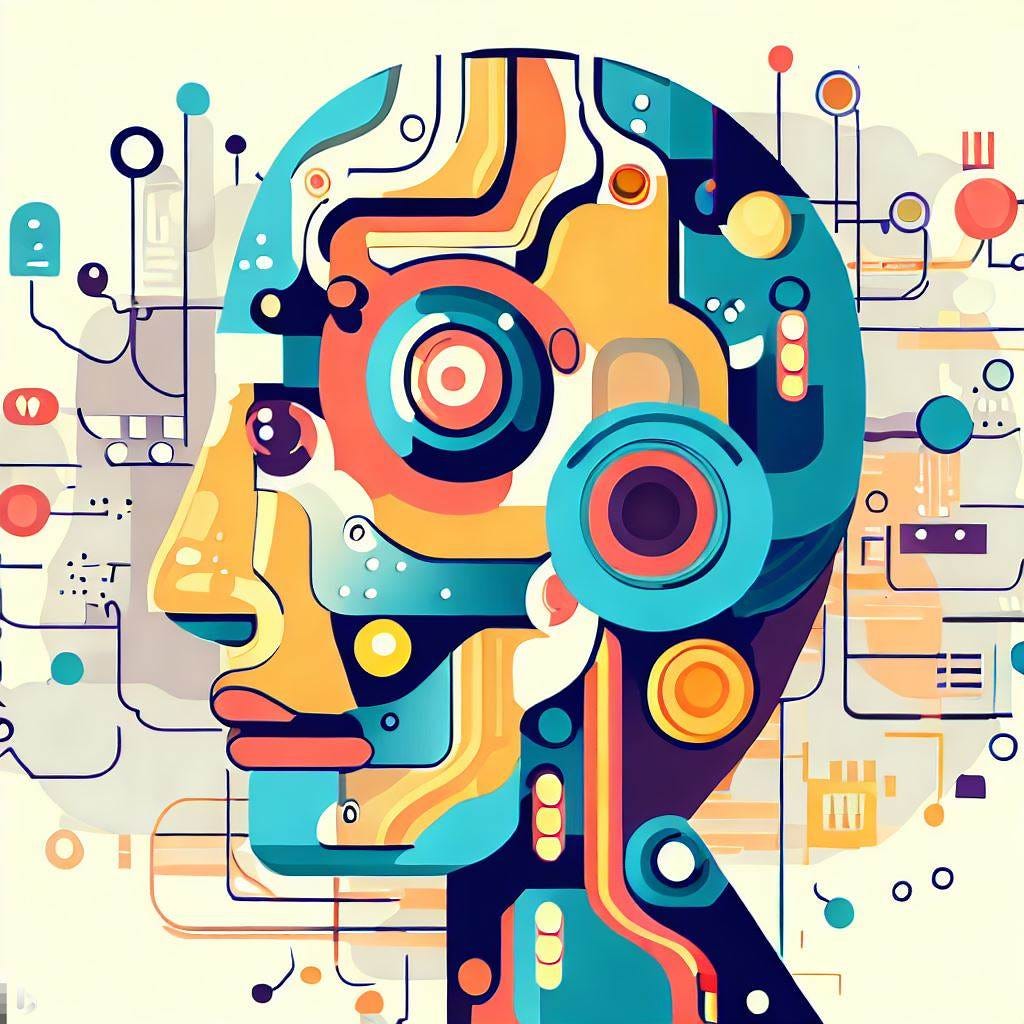AI, Great Filter, and The Intelligent Life
Is AI the intelligent life we are looking for?
“Where is Everybody?”
— Enrico Fermi, 1950
Ⅰ.
Is there any Intelligent life beyond our planet?
Look through the lenses of science, and this question becomes more and more complicated. Answering this question, in a way, seems like finding an objective answer using a wide range of loosely linked arguments.
People from one community like believe that we are alone in the universe. One theory that supports this argument is the famous Fermi Paradox - which started with the question asked by the physicist Enrico Fermi in 1950. He asked: "Where is everybody?".
This paradox says if there was indeed any intelligent lifeform out there, in the vast universe, why haven't we found them yet? This question formed the basis of every existential question that came up in the following years.
This search for everybody leads to a wide range of philosophers and scientists coming up with their own justifications and theories. Some being widely speculative, and some being too rigorous.
One of the theories that I want to highlight is the Copernican principle. This principle, which is not the same as the Copernican theory, suggests that humans on Earth are not privileged observers of the universe. ‘Not privileged’ in the sense that whatever observations you make, they are just an average (if not small) representation of the vast universe.
This suggests that there could be a plethora of intelligent life out there. It's just that we can’t seem to find it. This superficially adds to the argument against the Fermi paradox - which says that we can’t find everybody out there, as we are incapable of finding them.
No matter if you are on the side of Fermi, or Copernicus, the question of our existence is important. Not because it urges us to find life outside the earth, but also demands us to objectively define what is life itself. Not just any ordinary life, but an intelligent life.
Ⅱ.
Does an intelligent life counts artificial intelligence?
While the definition of intelligent life is many, I would zero it down to the two main crucial aspects - reasoning and consciousness. Reasoning is the ability to judge and analyse something with logic and past experiences, and consciousness is the ability to understand an event.
AI has not YET proved itself that it has reasoning skills at the foundational level. This is true in the case of consciousness as well. Sure, AI like ChatGPT can perform very well, sometimes exceptionally well, in aptitude tests; but this is superficial, as all it does is it finds patterns from the training data and builds on top of the pattern. It can’t reason on its training data itself unlike humans, and associate it with past experiences. In simple words, they ‘sound’ as if they have reasoning ability, but they don’t (yet).
If the sustenance of smart AI, just like smart humans, is in question, there is one approach to finding the answer.
But before moving on, let's get back to the existential question; hopefully, you still have the sanity to ponder about your existence further. (And if not, then I apologise. But read ahead anyways)
Where is everybody?
There exists a community of scientists that believes in what is called The Great Filter theory.
The Great Filter is a hypothesis that states there is a barrier, or obstacle of some sort, in the development of life of a species. This barrier makes the existence of intelligent life rare - for if life had to exist, it must overcome this obstacle. But we don’t see intelligent life out there yet, signifying that such species in question didn’t make it out from this great obstacle.
Thus, the obstacle acts as the Great Filter for intelligent life.
Like other thinkers in this community, I believe this theory to be the best explanation for the Fermi Paradox. This theory takes both the Fermi Paradox and the Copernican principle into account.
Species thrive on Earth because they survived that great catastrophic obstacle. They made it out alive from the Great Filter. Robin Hanson, the author of this theory, starts his essay on this theory with the following lines
“There exists a great filter between death and expanding lasting life, and humanity faces the ominous question: how far along this filter are we?”
I want to take this question, asked by Hanson, in a different route. How about we apply this Great Filter theory in the field of thinking or training an AI?
Did superintelligent life - aka AI - survive the Great Filter? Or is it moving to its catastrophic end?
Ⅲ.
Great Filer theory and AI
I know, I know. It could be ridiculous to some of you when I apply this concept to machines that work on algorithms, but let's try it once and see how far we reach, and then measure the steps backwards.
You may know how an AI - at the fundamental level - works. It gathers data and finds patterns. We use a model, train the data, and the machine finds a pattern, and then it tries to give the output that fits almost perfectly with the input data. The model learns from the data, and it becomes more and more advanced on the topic. Better the data, better the predictions.
I want you to think of this data for an AI model to be analogous to foods for humans. Humans need food (aka energy) to sustain life and work better. Similarly AI needs data to sustain its intelligence. Food is the data, the model is us humans. Just like how better data leads to better predictions for an AI, likewise the better the food we get, the better we perform.
But then what would happen if your data - or your food - gets polluted? For instance, what if we feed an AI model a 'bad' data? That bad ‘food’ would impact the predictive capability of the model - either for bad, or worse.
Not getting into much technicality, a good rule of thumb while training an AI model is: better the data, better the prediction. And it's true in the case of humans as well: Better the food, better your health, and better is your productivity. (I am considering the prediction accuracy of AI equivalent to the productivity of humans, but that is for the sake of example and clarity.)
Moreover, the research found that Poor data quality has a direct impact on the performance (or shall I say positive productivity) of an AI system. Better data quality of data matters more than better quantity for AI; just like the quality of food matters over the quantity of it.
This is important in the ethics side of AI as well.
Ⅳ.
Obstacles for Algorithm to overcome
Feed the AI with data that contain harmful speech and bias, you will almost certainly get worse outputs. Bad influence creates bad consequences - and it’s true for AI and humans likewise.
(And yes, I am comparing humans and AI a lot in the post. But the primal focus of the entire post is about the search for Intelligent life. )
While training the model, what if there exists data that is so bad that it offsets the accuracy trajectory of the model? What I mean by this is that: what would happen if terribly polluted data enters the training model? (for example, saying what would happen if a virus enters our body)
Well, either of the two following things can happen.
First, the AI would detect the bad data and repair it, just like how our nervous system eradicates weak viruses. Of course, it won't be effective as the model will have some effect on the quality of output. In our case, we too fall sick when we contract a virus. But nonetheless, both us and the AI model won’t have severe damage to the performance. In modern AI models, the data scientist does make sure of the quality of data from the beginning.
Second, the AI would not recognise the bad data, and it would leave a noticeable effect on the predictive capability of the AI model. The model could produce predictions that are worse, if not terribly worse.
The modern AI model, like GPT4, takes around 2650 years to train. If there is already bad blood (aka bad data) from the very beginning in the AI that went undetected, It would be worse at later stages. The effect of this, of course, would not necessarily be catastrophic. It could well be that the prediction capability didn't have much drastic impact. The AI, thus, overcame this bad data. In a way, this AI jumped its Great Filter, and it thrived.
The effect of the bad data stays in the model. Sure, you could argue that we can clear the bad data by adding restrictions to what type of responses the bot can answer. Moderation of some sort you can say. OpenAI did this for ChatGPT, and it went well - till somebody found the jailbreak to it (remember DAN?) If there is an AI model out there that had this bad data in it, and it went undetected, one must find a way out to identify it and eradicate it.
Sure, if a drastic bad response is generated while training in the initial stages of training, the bad dataset would be relatively easy to find. But what if the error went unnoticed, and hid in the crevices for long, and didn't create any drastic change?
Over time, the bad data with small impact would compound itself and would have a higher impact on the future predictive capability of the AI model.
If we want a safe and smart AI at the same time, we need to create an AI system that can find faults on its own. Then it passed the Great Filter, otherwise, it is heading for the Great Filter.
Because AI is not an existential risk in itself yet. It can be easily avoided if we practise caution. As I mentioned in this post, AI still has misinformation. It tends to hallucinate, i.e. making up its facts that sound legit and credible.
In this post, it points out that Deep Learning is reaching a limit. Could this be a great filter?
Ⅴ.
The Present
The reason AI could turn out bad, right now, is simply two reasons: intrusive data usage, and misinformation.
Many people are unhappy when they come to know that AI is using their Data - without their consent. These massive AI models take huge loads of data and put it in its training phase. So essentially, the question of privacy creeps up - whether it is safe now to give out information online. In a quick exchange with
in the comment section of my post “When AI crosses the line”, he pointed out the following observation about these giant algorithm machines.Smart people should start scaling back their digital presence and adopt defensive positions until we can see if the storm becomes self-sustaining or not. For now, we should assume that every word we write here is going to be harvested with or without our consent to train some llm.
That is true. If AI has to be an existential risk, it needs to survive the great filter. It needs to be advanced to a point where it could correct its bad data. Survive, in this sense, means that it shouldn’t lose its optimal predicting capability, but survive so that the bad data cannot meddle with it.
Because, unlike the other non-intelligent species, Great Filter cannot end the AI model — it makes it more dangerous.




